…Says I Regret Annulling The Election
ALMOST 32 years after, former Military Head of State, General Ibrahim Badamasi Babangida, finally admitted that the late Chief Moshood Abiola (MKO), won the June 12, 1993, presidential election.
General Babangida made the revelation in his autobiography, “A Journey in Service”, which was launched in Abuja today.
The book was reviewed by former Vice President, Prof. Yemi Osinbajo.
Babangida, in the book, said the late MKO Abiola, who contested the presidential election on the platform of the Social Democratic Party (SDP), secured the majority of votes and the geographical spread to be the president.
He described the June 12 election annulment as the most challenging aspect of his life.
“There was no doubt in my mind; MKO Abiola won the election. He satisfied all the requirements,” he said.
IBB as he is popularly called, however, expressed happiness that former President Muhammadu Buhari acknowledged that Abiola won the election and honoured him with the greatest national title of the Grand Commander of the Federal Republic, GCFR, which is meant only for presidents.
I Regret Annulling The Election
Meanwhile, for the first time in almost 32 years, General Babangida finally expressed regret over the annulment of the June 12, 1993 Presidential election, saying he would do things differently if given another chance.
Speaking after former Vice-President Yemi Osinbajo reviewed the book, IBB took responsibility for the cancellation of the exercise which was a two-horse race between Abiola, candidate of the Social Democratic Party (SDP), and Bashir Tofa of the National Republican Convention (NRC).
“I regret June 12. I accept full responsibility for the decisions taken and June 12 happened under my watch. Mistakes, missteps happened in quick successions,” he said.
In an interview that he previously granted, IBB had defended the annulment of the June 12 election.
While saying he agreed that it was free and fair and also the best of all elections ever conducted in Nigeria’s history, he said Nigeria was not ready for democratic rule as of the time the election was held.
“June 12 was accepted by Nigerians as the best of elections in Nigeria. It was free and fair. But unfortunately, we cancelled that election. I used the word ‘unfortunately’, for the first time. We were in government at the time and we knew the possible consequences of handing over to a democratic government. We did well that we wanted ours to be the last military coup d’etat. To be honest with you, the situation was not ripe to hand over at the time.
“Forget about the wrong things that happened in politics. The issue of the security of the nation was a threat and we would have considered ourselves to have failed if six months after the handover, there was another coup. I went through a coup d’etat and I survived it. We knew that there would be another coup d’etat. But not many people believed what we said. They could have allowed me to go away and then they (coup plotters) would regroup and stage another coup. This is how coups are staged – one man will always come to complain. And he will try to convince you about his complaints,” Babangida said.
He said security threats to the advent of democracy at the time culminated in fresh plans to conduct another election within another six months after the June 12 annulment, with a better strategy, but which he said he could not achieve as a result of the hostility which accompanied the cancellation. According to him, another election was conceived to come up in November 1993.
He revealed further that he was determined to conduct another election which culminated in the constitution of an Interim National Government (ING), which he noted was eventually toppled by a military coup staged by General Sani Abacha.
Additional reports courtesy of Daily Trust
Eighteen-Eleven Media


